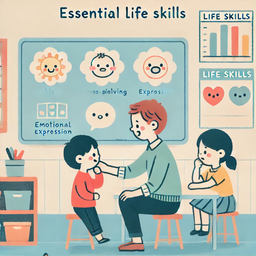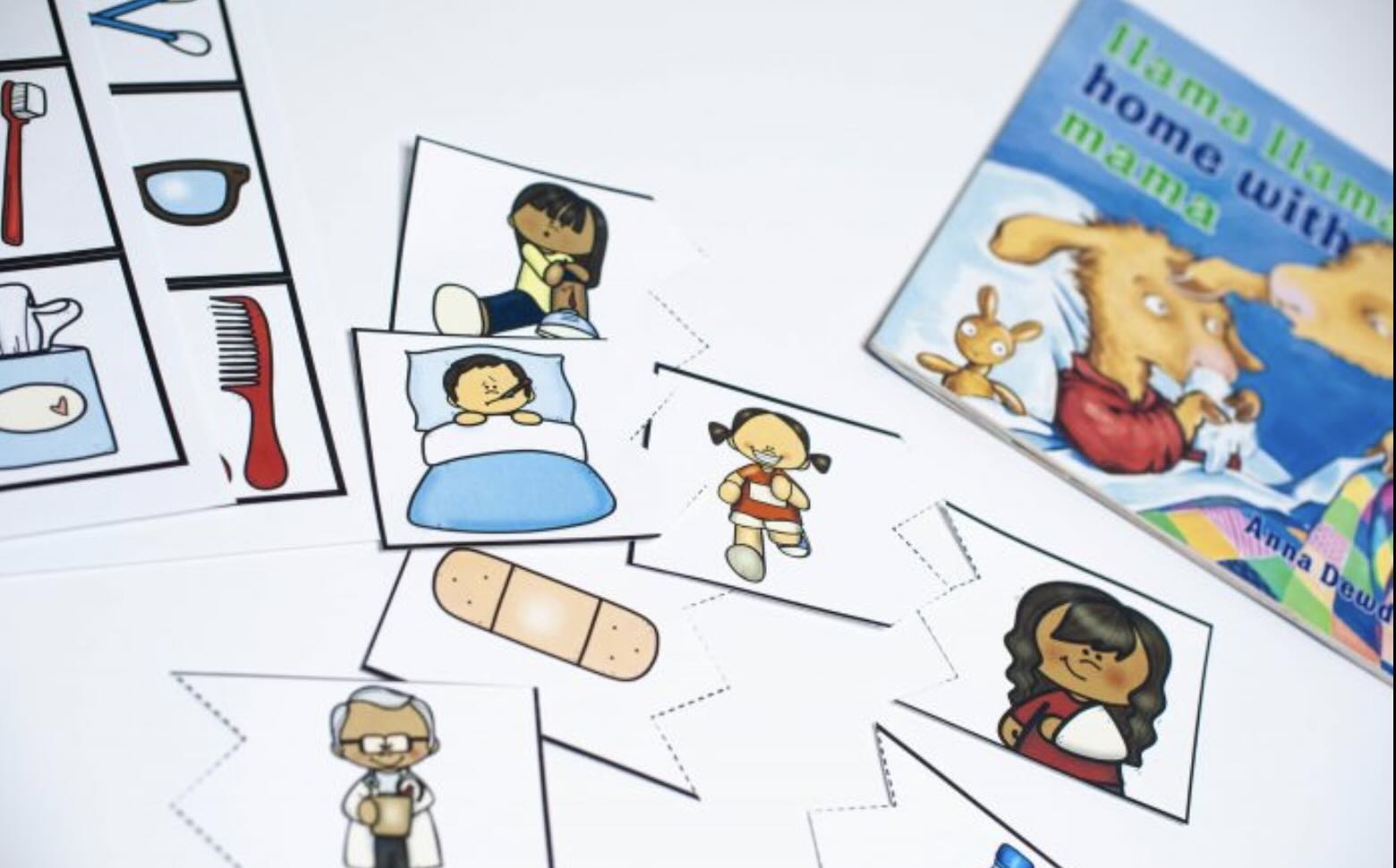
We are sure you keep hearing the buzzword – life skills. But let’s be honest, how many of us know what are life skills? Well, UNICEF defines life skills as “a group of psychosocial competencies and interpersonal skills that help people make informed decisions, solve problems, think critically and creatively, communicate effectively, build healthy relationships, empathize with others, and cope with and manage their lives healthily and productively.
Too complicated? Let’s make it simple.
Life skills are all you need to thrive and truly make the most of your life. They are the most important skills you can teach your children. Above all the math skills and the art and sports skills, life skills will enable them to unlock their best in life – as a well-rounded person.
Read this UNICEF article to understand how students are encouraged to solve real-life problems faced by their community,
The 3 Key Life Skills
Google the words key life skills and it will throw up myriad words. From communication and interpersonal skills to decision-making, problem-solving, and creative thinking skills. It is, however, not as complicated as it is made to be. Let’s get the foundation done right first for the children.
To start teaching children life skills, start with the 3 basics:
- Self-awareness: It is the ability to tune in to your feelings, thoughts, and actions. It also includes understanding how others may feel about you. It helps children to reflect and think about their actions and behavior logically and fairly.
- Self-management: Simply put, it means how to manage oneself in a variety of situations. It is the ability to manage one’s behaviors, thoughts, and emotions in a conscious way to maximize positive outcomes.
- Social awareness: The ability to understand others’ perspectives and to empathize with them is social awareness. It also includes being cognizant of social, ethical, and cultural norms.

These three form the plinth of the edifice of achievement that children will build in their course of life. In this article, we intend to take you through some simple techniques and activities for teaching children life skills in daily life. Our focus will be the above 3 life skills that we deem most important for every child’s overall development.
5 Easy and OFFBEAT Ways of Teaching Children Life Skills in Daily Life
Teaching life skills doesn’t have to be complicated. It can be done through simple activities that can fit into daily life very easily. Daily life activities are a great way to share the basics of self-awareness, social awareness, and self-management. The last one is typically the most important since unfavorable situations can occur in daily life. No matter how big or small they are, they are all still opportunities to learn the above-said 3 key life skills.
Here are 5 easy ways of teaching children life skills in daily life:
1. Do a TV interview role-play with them
Chances are that your child has a superhero, a political figure, a scientist, or a movie star as their ideal. Ask them to pretend to like their favorite star and get into a role-play with them. For example, if your little girl adores Michelle Obama, ask her to think of herself as someone as important as her for a moment. Become Oprah Winfrey for them and ask them questions about themselves. You could try the following:
- “So, what is that one quality of yours that you like the most?”
- “If you had to define yourself in one sentence, what would it be?”
- “Right now in life, what is your top goal?”
- “What qualities do you adore the most in other people?”
This is a rather fun game for most children – across all age groups. It is for many reasons, one they love to pretend like someone important or like a celebrity. Two, they get to talk about themselves without getting conscious. For teachers and parents alike, it is a great way to elicit responses from children that can be a revelation to themselves too. If you look carefully at the kind of questions above, you’ll see that they are all about defining oneself with clarity. Knowing who they truly are is a life skill. All their choices and decisions will stem from it and they will thrive if the alignment between their true self and their choices is not disturbed by outside situations. Encourage them to own and be proud of their self-concept, whatever that is.
2. Use the 3 Cs: Cooking, Cleaning & Caring
Cooking and cleaning are great ways to teach children important life skills like planning and execution with a goal mindset. For example, there are many life skills required and developed by planning, organizing, purchasing food, and preparing snacks & meals which are part of cooking. Shopping for a recipe alone needs a lot of social awareness. For example, knowing the right behavior at the grocery store and making sure to dress up in a socially appropriate way.

Similarly, caring for one’s home and environment is a great way to lead by example and teach the necessary life skill of self-management to children. For example, teach them that putting trash in the dustbin and going ten extra steps or taking a detour to do so is okay. Show them that you care for the environment and for your loved ones. Caring also means caring for people in the family and hence regulating one’s emotions when they’re mad at someone. So the next time your child fights with their sibling, use it as an opportunity to teach them self-management. Ask them about an approach they’d take to express their anger appropriately and still care for their sibling while expressing their displeasure respectfully and patiently.
3. Take them frequently on community outings
Community outings are a great way to teach children self-management. There are bountiful opportunities in every common community outing for your child to learn how to wait, complete formalities, etc. For example:
-
Grocery store outing – choosing healthy food and rejecting junk, looking out for the right deals, etc.
-
Doctor’s clinic – filling out forms, waiting patiently, etc.
-
Restaurants – polite manners, making healthy food choices, etc.
-
Parks – taking turns on the swings, maintaining cleanliness, greeting others politely, making way for the elderly and small children, etc.
4. Have a game routine – teach them healthy behaviors by playing games
Playing simple flashcards-based and board games can do wonders for your child. Especially, games like Head Rush – a social skills game that helps develop mindfulness, self-awareness, and communication. There are a bunch of other games designed to teach appropriate social behavior, the right behavior in different situational challenges, etc. This, for example, is a nice game to teach better communication and self-management to children.

playing games
Make playing such games a part of your daily routine. Play for at least 30 minutes a day and watch your child very organically develop the aforesaid life skills.
5. Get them a personal life coach
If your child is a middle schooler, then this is for you. Life coaching is the answer to many concerns you may be facing as a parent. It can also eliminate all doubt you may be harboring about your child’s appropriate social and emotional development. A life coach can help your child develop key life skills in multiple ways, for example, they can:
- Empower them to foster critical life, relationship, and learning skills
- Enable them to navigate challenges with ease
- Help them understand themselves better and identify the right goals and course of action for themselves
- Address limiting beliefs and remove the roadblocks of negative thinking
Interested, but don’t know where to find the right life coach for your child? Look no further! At PALO, we advocate skill-building for middle schoolers to help them learn life skills and unlock their best potential. We aim to spark a zest for life in every child!
Also read: 5 Ways to help your child set effective goals
We hope this article was helpful in your quest to unlock the best learning trajectory for your child. Explore our official blog for more such articles that encapsulate a whole world of easy and actionable parenting tips for children of all age groups. We post new articles every week, stay tuned!